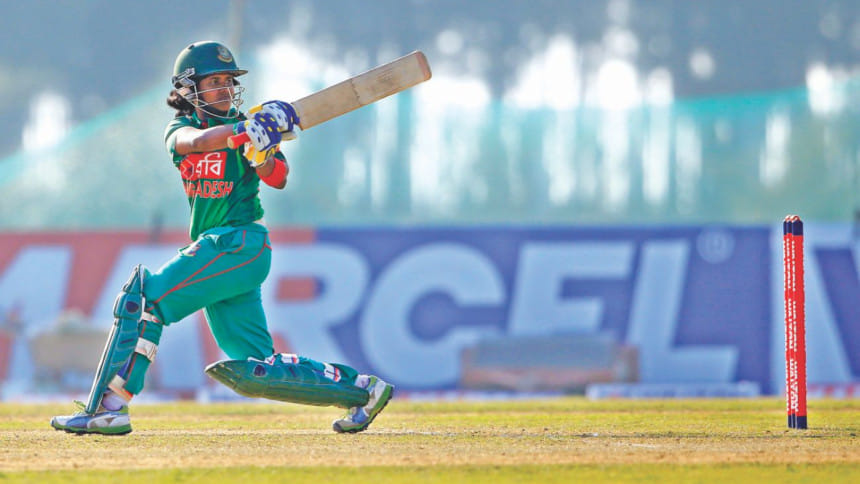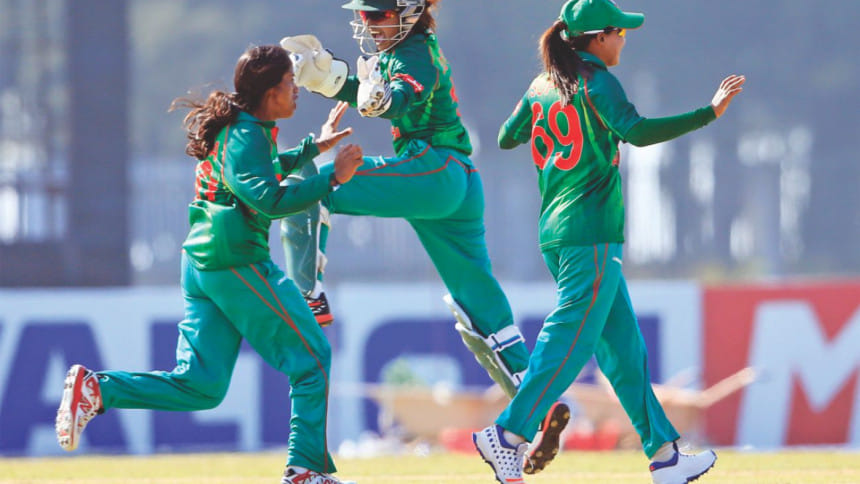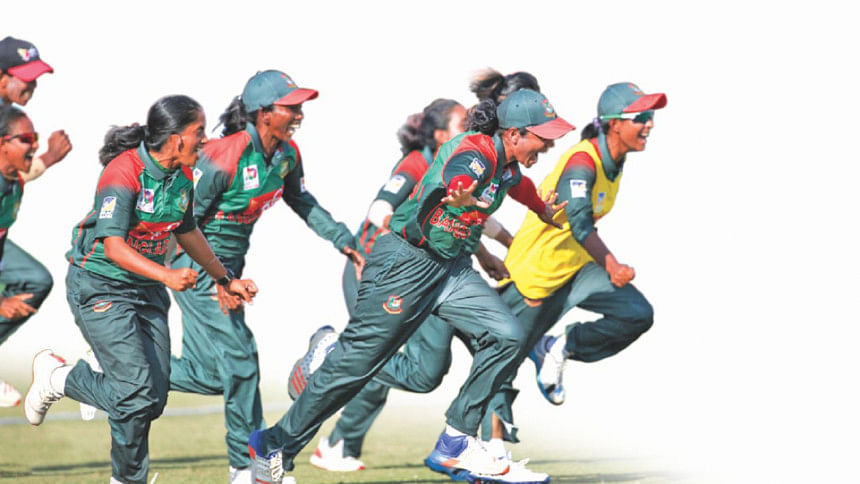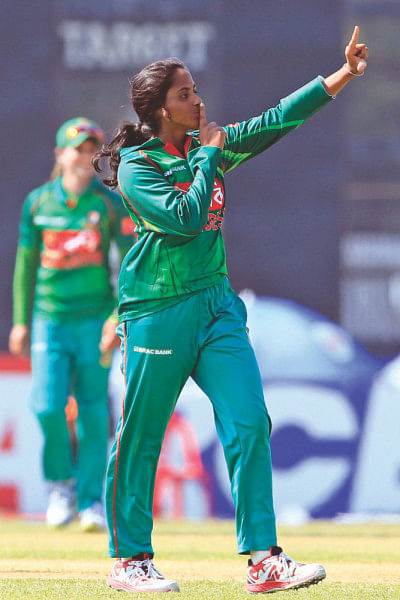An undying spirit

10 years ago, the Bangladesh women's cricket team embarked upon their first ever Asia Cup journey. The Women in Green were all set to play the opening match of the four-team tournament, taking place in Sri Lanka, against India.
Around 30 minutes before the scheduled start-of-play, however, Bangladesh's 17-year-old captain, Salma Khatun, twisted her ankle while going through her warm-up routine. She was devastated. Just a teenager, Salma was easily Bangladesh's most sought-after player back then.
As a result, she limped her way through the game. The Tigresses though ended up losing the ODI by 182 runs. With her right leg swollen, Salma had to be carried off the field by her teammates. "It was the worst possible start to my career as a captain," Salma recalls. "Can you imagine how it feels when you have been given the honour to lead the team at such a young age, and you fail just because of a mishap?" she adds.
Oddly enough, there wasn't a gap day scheduled in the tournament, and Bangladesh was set to face Pakistan the very next day. Salma had one night to recover. "I basically spent the entire night placing one ice pack after the other on my leg. I don't think our physio or coach slept the night either," she remembers.
The following day, Bangladesh created history. Salma scored an unbeaten 53, and the Tigresses won the game by four wickets. The fact that Bangladesh were yet to be awarded the ODI status made the win a lot more special.
"On the first day I was lifted off the field because I was injured. The day after, I was carried off the field because I was the player of the match. It was then that I realised how much I loved the game. I decided to stick to it no matter what people said," says Salma.

True to her word, a decade later, Salma was the captain again when Bangladesh lifted the Asia Cup T20 in Kuala Lumpur, earlier this month. While she isn't necessarily the only player the Tigresses depend upon today, with several young talents making their way through, she still remains the guardian of the team.
"It's been two weeks since we won the Asia Cup, but I still can't really describe the feeling in words. Ever since I started playing cricket in 2007, I always wanted to win something big for my country, but I never really expected to achieve that dream so quickly," says Salma.
The Bangladesh captain's ecstatic emotions are understandable. In order to truly comprehend Bangladesh's Asia Cup win or their win against India, one has to analyse the kind of position that the women's cricket team holds.
For starters, the Bangladesh women's team doesn't hold Test status and doesn't enjoy the opportunities of the more elite teams. It is ranked ninth, which means that it does not get enough opportunities to play against higher-ranked sides. Ever since they received ODI status in 2011, the team has played just 41 ODIs.
India played the final of the 50-over World Cup in England last year, whereas Bangladesh still needs to go through the qualifiers to compete in any major event. In addition, there's a huge difference between the pay scales of the two teams, with the highest graded Indian player earning Tk 56 lakh more than their Bangladeshi counterparts.
Considering these circumstances it's quite extraordinary that the Tigresses have managed to ace a trophy so early in their careers. The fact that the Bangladesh men's team is yet to add any silverware from tournaments involving three or more teams makes this Asia Cup win a lot more special.
When you speak to the cricketers and the coaching staff you realise that the one thread that binds most of them together is their stubbornness. It's not a secret that the Bangladesh women's cricket has been ignored by the Bangladesh Cricket Board (BCB) for quite some time. The fact that they are yet to organise proper regional tournaments and form age-level national teams is testimony to that.

The board, however, can't always be blamed. While you get sponsors churning out crores of takas for the men's team, the allocation for the women's team is negligible. And all this eventually affects the national team with the players not getting enough game-time to improve themselves in the international circuit.
As such, almost all the players have had to struggle quite a bit. In order to survive they have had to be rigid in their determination. Salma's story of leading Bangladesh to a win over Pakistan 10 years ago with an injured leg is just one of the many examples that proves this point.
Take the case of all-rounder Rumana Ahmed, the player of the match of Asia Cup's final game. Rumana joined the national team as early as Salma, back in 2008. She was selected as an off-spinning all-rounder. And yet, two years down the line, she was excluded in the final squad for a tri-series. There were too many off-spinning all-rounders in the team and she didn't fit the bill.
Back then, women's cricket in Bangladesh was still taking its baby steps, and had she wanted, she could have easily chosen another career path. However, Rumana decided to turn the tables. She decided to change her bowling style and become a leg-spinner, a rarity in Bangladesh cricket.
"I was always big fan of Shane Warne. He is a magician. When I was not selected in the squad in 2009, I told myself that this was the only way I would be able to break into the squad again, and I changed," she recalls.
Making that shift, from being a finger-spinner to a wrist-spinner, is never easy. Things were a lot more difficult for Rumana since there weren't any leg-spinning coaches or players in the national circuit she could look up to.
"That's when I started looking at Shane Warne's videos a lot more closely. I tried to understand how he grips the ball and how he delivers it. I tried to follow the way he calmly walks up to the crease. I also had a younger brother from Khulna who bowled leg-spin, he helped me as well," says Rumana.The change not only helped her claw her way back into the team, but she also went on to become the first Bangladeshi women's cricketer to scalp a hat-trick, in 2016.
Upon returning home, Rumana found her home in Khulna stuffed with huge bouquets of flowers from politicians, well-wishers and people she didn't even know. It was the first time that she had received such a response from her city.

"Before the Asia Cup, people did know that there's something called women's cricket. But after our win, they actually know us better and they talk about our achievements. The perception has changed," explains Rumana.
While she was delighted at the way she was received back home, the all-rounder believes that the national team's progress could have been a lot quicker, had they managed to play more international matches.
"You know, players from Pakistan and Sri Lanka are surprised that we still have to play qualifiers to reach the World Cup. Even I personally believe that, as a team, we are a lot better than many who play in the World Cup," claims Rumana.
"The only problem is that we lack in confidence. That's because we don't play enough international cricket. We play one to two international series a year and spend the rest of the year sitting at home and waiting. You can't improve like that. You need to keep on playing," she adds.
Before going to Malaysia for the Asia Cup, Bangladesh had gone to South Africa to play five ODIs and two T20Is. They failed to win a single game and were criticised when they returned home. The all-rounder believes that going to South Africa right before the Asia Cup was a turning point.
"Many of you [the media] asked us if we would be able to do well in the Asia Cup following the South Africa series, since we lost all the matches. We had made many mistakes in South Africa. We realised those mistakes and corrected them. Because the Asia Cup was right after that series, we applied ourselves well," she explains.
"We were on a flow and that's why we did well in Malaysia. Had we gone back home like every other time and simply sat down and done nothing, things would have been different," adds Rumana.
As a result of the surprise win, the BCB has been compelled to take decisions, which earlier didn't seem to be in the reckoning. For instance, they increased the salaries of the national cricketers by around 60 percent. The highest-graded players now earn Tk 50,000 per month, a Tk 20,000 increment. According to the head of the BCB's women's wing, however, a request to increase the salary of the cricketers, in March this year, wasn't entertained.
The BCB seems a lot more focused on organising school and district level cricket from the next cricketing season onwards and they are also likely to opt for a separate sponsorship for the women's cricket team in the future.
Everything seems to be rolling at the moment. However, the danger, as it so often happens, is that these moves may lose steam after a few months or after a few bad results. The BCB needs to understand that Bangladesh's Asia Cup win will definitely inspire a new stream of cricketers to join the game and only a proper, long-term plan can help the board tap into this new generation.
The Bangladeshi cricketers are currently in Ireland to play a three-match series and to take part in the ICC World T20 Qualifiers. It's a series that hasn't received as much attention in Bangladesh due to the football World Cup. It's also a series that the Tigresses are expected to win.
'Expected to win,' that's a phrase that the Bangladeshi cricketers will have to deal with more often now, having raised the expectation with the Asia Cup win. After all that's what sports is all about. You create a new kind of pressure when you surpass a new boundary and in order to stay on top, the BCB needs to address this with a new outlook.





Comments